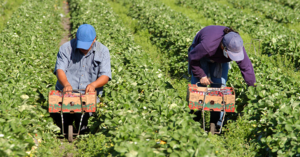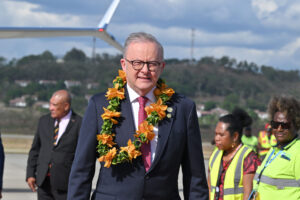Pacific Labourers overtaxed and exploited in Australia

The Pacific-Australia Labour Mobility (PALM) scheme is often presented as being beneficial to all parties—Australia, Pacific workers, and those workers’ home countries. In reality, the benefits are weighted in favour of Australia.
Fruit pickers and meat workers who fill chronic labour shortages in Australia are being overtaxed and exploited, new research from The Australia Institute has found.
Workers holding Pacific Australia Labour Mobility (PALM) visas can be the difference between fruit being harvested or left to rot on the vine.
But, in return for the critical work they do to keep some sectors of our agriculture industry afloat, PALM visa holders pay more tax than Australians doing the same work and find it almost impossible to access their superannuation.

The Pacific Australia Labour Mobility (PALM) scheme allows Australian businesses to hire workers from ten countries in the Pacific region.
PALM visas are issued for short- or long-term jobs (up to nine months or four years, respectively), provided those jobs are classified as low-skilled, semi-skilled or unskilled.
Prime Minister Anthony Albanese consistently talks about being part of a “Pacific Family”, lauding the PALM program as a key component of that close regional relationship.
But the Australia Institute’s new report finds the PALM program is in urgent need of reform if Australia is to truly treat these workers like family.
No way to treat family
PALM visa holders often pay more in tax, in both wages and compulsory superannuation contributions, than Australian residents in the same jobs.
PALM workers could be paying an estimated $184m in tax each year to the Australian government — a fifth of the $920m Australia paid in ‘support’ to participating Pacific nations this year.

It is almost impossible for PALM visa workers to access their superannuation entitlements once they return to their home countries, meaning they are likely missing out on millions in unclaimed entitlements.
If they do manage to access their entitlements, they are taxed at a rate that takes away more than a third of their superannuation.
The amount of money that PALM workers spend in Australia—on accommodation, expenses, tax and superannuation—is greater than the amount they are able to send home, meaning that Australia’s economy benefits more from their labour than their home countries’.
The path forward
Recommended reforms include automatically transferring superannuation payments to workers’ home countries or paying superannuation entitlements directly to workers as they are unlikely to retire in Australia.
Pacific workers come to Australia to do hard jobs that Australians don’t want to do, like fruit picking and meat packing. But they are overtaxed and exploited for the pleasure
— Gemma Killen, Research Manager at The Australia Institute and co-author of the report.
It is alarming that vulnerable workers who do not earn very much money are paying more tax than Australian residents who do the same work. It is equally alarming that these workers struggle to access their super once leaving the country.
The PALM scheme is often framed in terms of mutual benefit but, in reality, the economic benefits are weighted heavily in Australia’s favour. The Australian government claims to be a friend to Pacific countries but is not treating Pacific workers accordingly.
The Australian government could easily reform the system so that workers are paid more and face less administrative burdens to access their payments.
Related research
Between the Lines Newsletter
The biggest stories and the best analysis from the team at the Australia Institute, delivered to your inbox every fortnight.
You might also like
A fair go for temporary workers from the Pacific
On a whistlestop tour of Fiji, Tonga, and Vanuatu in May, Foreign Minister Penny Wong wanted to focus on climate change, security, and aid funding.
Pacific nations have just delivered Australia two smackdowns. That’s a big deal.
We need to talk about the Pacific.
Labor giving billion-dollar cost of COP to Pacific would show genuine climate leadership
The Australia Institute is calling on the Albanese Government to redirect the billion dollars saved by not hosting COP31 to Pacific nations.


